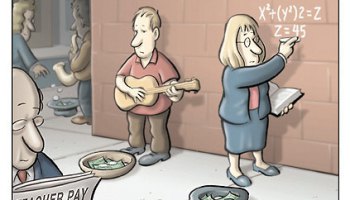Nashville teacher Amanda Kail offers thoughts on the current national climate with teacher strikes or other actions in West Virginia, Kentucky, Oklahoma, and Arizona. She takes a moment to explain (from a teacher’s perspective) why this is happening and if it might happen in Tennessee.
Here are her posts:
If you are not a teacher, here are some things you might not know about why so many teachers are striking right now:
1. Most public employees, including teachers, have had their salaries frozen since 2008. In Nashville, step increases that are meant to keep up with inflation and encourage teachers to stick with the job were reintroduced only last year, and only then because MNEA stood up and fought for it. Even so, with the reintroduction of step raises (such as they are- in Nashville it takes a teacher with a MA 10 years to earn $50,000), teacher salaries are now barely above what they were 10 years ago, while cost of living and health care (because our legislature refused to expand medicaid) has sky-rocketed. In Oklahoma, many teachers were seeing the cost of their health insurance exceed their paycheck. This is why you are seeing teachers demand significant raises, not because we are greedy or want gold-plated glue sticks.
2. In states without strong teacher unions, state funding for public education has been continually slashed. In Oklahoma, many districts have been forced to go to a 4 day school week. Here in Nashville, a city with a booming economy that outpaces national averages, parents and teachers find themselves having to fight not only for school employee raises and basic supplies, but for funding school lunch programs and filters to remove lead from school drinking fountains. How can this be? Tennessee ranks 43rd in the nation for per pupil funding, and our state legislature which is so generous with its offers of guns and “In God We Trust” signs, only gives us about 60% of the money we are allocated in the state budget. So 60% of already drastically underfunded = hungry kids drinking leaded water in the “It City”. And guess who mostly makes up the difference for public school kids, who provides not only school supplies, but clothing, food, medical care, transportation, and even emergency housing? Teachers. Out of our own pockets. With our low and stagnant wages. This is why you are seeing teachers who have never attended a political rally before suddenly fighting so fiercely. We ARE doing it for the kids.
3. When teachers say we want “respect”, we don’t mean more cheap tchotchkes that say “we ![]() ❤ teachers”, or more politicians to say, “thank you for all you do for our kids blah blah blah”. We mean that we want evaluation systems that are fair. That we want our professionalism to not be measured by tests that are deeply flawed and poorly planned (TN’s state tests have had major problems 3 years in a row, including one year that the test had to be abandoned mid-session). That we want leaders who have proven themselves in the classroom first, not hatched out of some neoliberal think-tank dedicated to robbing public schools for the DeVosses of the world. That we want to have the time to design lessons, grade, and teach without interruption by more unfunded mandates. It means that teachers who choose to work with low income students, students with disabilities, and immigrants should have the time, resources, and even more importantly, the trust that we know what we are doing, so we can fill in the foundational skills our students need in order to grow so that they can function on grade level, or beyond! It means giving us class sizes and case loads that are manageable. It means that our districts should consult us as experts in the field on curriculum design and proper assessment before throwing away millions on more pre-packed crap that will end up collecting dust in the closet somewhere. It means valuing veteran teachers with teaching degrees from respected universities enough to pay competitive wages and offer paths to leadership. Seriously, you can keep the tchotchkes.
❤ teachers”, or more politicians to say, “thank you for all you do for our kids blah blah blah”. We mean that we want evaluation systems that are fair. That we want our professionalism to not be measured by tests that are deeply flawed and poorly planned (TN’s state tests have had major problems 3 years in a row, including one year that the test had to be abandoned mid-session). That we want leaders who have proven themselves in the classroom first, not hatched out of some neoliberal think-tank dedicated to robbing public schools for the DeVosses of the world. That we want to have the time to design lessons, grade, and teach without interruption by more unfunded mandates. It means that teachers who choose to work with low income students, students with disabilities, and immigrants should have the time, resources, and even more importantly, the trust that we know what we are doing, so we can fill in the foundational skills our students need in order to grow so that they can function on grade level, or beyond! It means giving us class sizes and case loads that are manageable. It means that our districts should consult us as experts in the field on curriculum design and proper assessment before throwing away millions on more pre-packed crap that will end up collecting dust in the closet somewhere. It means valuing veteran teachers with teaching degrees from respected universities enough to pay competitive wages and offer paths to leadership. Seriously, you can keep the tchotchkes.
4. I’ve said it before, and I’ll say it again. Trust teachers. We are fighting not only for our own babies, but yours. We stand up for EVERY kid in our community, and we see first hand what happens when communities refuse to do the same. If we say there is a problem, we mean it. Support your local teacher union. Advocate for your neighborhood school. Question why the schools that serve mostly poor kids often look so neglected. Demand that the political candidate of your choice fight to support public schools. Vote like every kid in your state is depending on you. Teachers should not have to put our whole careers on the line to show how badly things have gotten, but we will. So listen. And join us.
On whether there may be strikes in Tennessee:
I have had several people ask me about the possibility of Nashville teachers going on strike. Here is what I will say: Sometimes a walk-out doesn’t look like a picket line. It looks like the 100 or so vacancies our district can’t fill. It looks like increasing numbers of teachers leaving in their first and second years. It looks like veteran teachers deciding to leave the career they loved because they can’t take anymore of the insanity and nonsense wrought by testing. It looks like unstaffed after-school programs because most teachers have to work second and third jobs. It looks like less and less experienced teachers in the classroom, because no one else will put up with it.
Every time a teacher leaves, the students of that teacher lose ground. I’ve seen classrooms become revolving doors of inexperienced and overwhelmed teachers, giving way to subs or overloading other classrooms. Our kids deserve better.
Here is the thing. Teachers really can’t go on like this, and we are having less and less to lose. I think it is HIGH time that the city of Nashville, not just Dr. Joseph and the BOE put school employee raises as a number one priority. The 2% “raise” we are currently being offered barely covers inflation. It still takes teachers with an MA 10 years to reach $50,000, at the same time the administrators at Bransford make more than our city’s mayor. Something has got to give.
Teachers, what are your thoughts?
For more on education politics and policy in Tennessee, follow @TNEdReport



